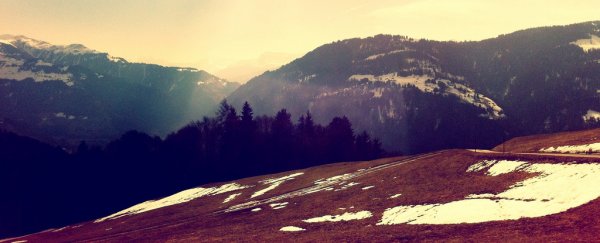Scientists regularly warn us that global warming will have a long-term impact on Earth's environment, but a new study suggests that humanity's carbon footprint is causing climate change on an almost unimaginable time scale.
According to researchers, the level of carbon dioxide (CO2) emissions in the atmosphere has effectively suppressed the next naturally occurring ice age, meaning it will now be twice as long before the planet undergoes another glacial cycle.
"Even without man-made climate change we would expect the beginning of a new ice age no earlier than in 50,000 years from now – which makes the Holocene as the present geological epoch an unusually long period in between ice ages," said Andrey Ganopolski from the Potsdam Institute for Climate Impact Research in Germany. "However, our study also shows that relatively moderate additional anthropogenic CO2-emissions from burning oil, coal and gas are already sufficient to postpone the next ice age for another 50,000 years."
In other words, burning fossil fuels is causing a planetary postponement of the natural rhythm of Earth's ice ages, meaning we won't see another one for about 100,000 years – if the researchers are correct.
"The bottom line is that we are basically skipping a whole glacial cycle, which is unprecedented," said Ganopolski. "It is mind-boggling that humankind is able to interfere with a mechanism that shaped the world as we know it."
According to Ganopolski and his team, ice ages are determined by a functional relationship between the amount of carbon dioxide in the atmosphere and insolation (aka solar radiation). Running simulations on an Earth system model, they say this relationship explains the onset of the last eight ice ages – and can also help us predict when the next glacial periods will begin.
The remarkable aspect of the findings, which are reported in Nature, is how they suggest what might be a fundamental turnaround in the powers that define Earth's environment.
"Like no other force on the planet, ice ages have shaped the global environment and thereby determined the development of human civilisation. For instance, we owe our fertile soil to the last ice age that also carved out today's landscapes, leaving glaciers and rivers behind, forming fjords, moraines and lakes," said Hans Joachim Schellnhuber, director of the Potsdam Institute. "However, today it is humankind with its emissions from burning fossil fuels that determines the future development of the planet."
The researchers say the transition to a world where the climate is controlled by human activity provides evidence that we are now living in a new geological epoch, echoing recent calls made by other scientists.
"This illustrates very clearly that we have long entered a new era, and that in the Anthropocene humanity itself has become a geological force," said Schellnhuber. "In fact, an epoch could be ushered in which might be dubbed the Deglacial."
